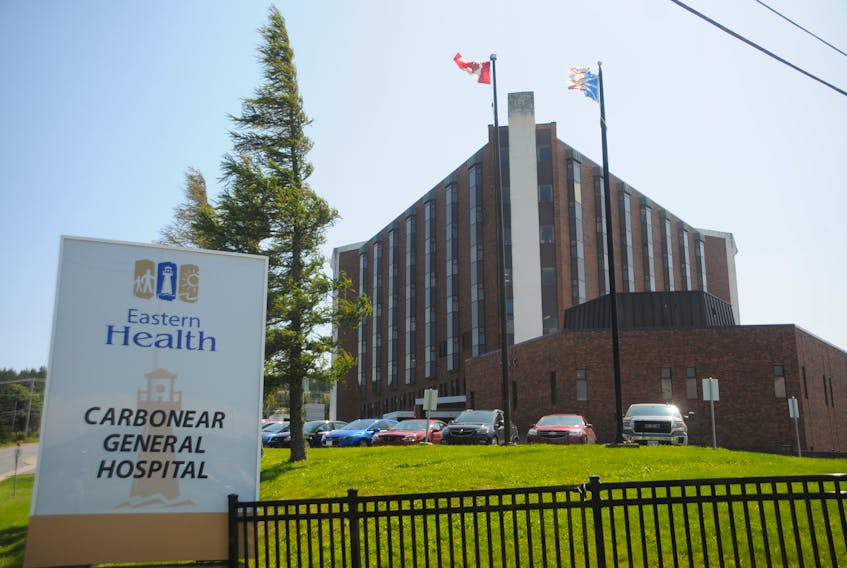
When Jerry Earle, the president of the Newfoundland and Labrador Association of Public and Private Employees (NAPE) addressed a protest rally on the grounds of the Carbonear General Hospital last month, the nucleus of that protest revolved around the working hours of 40 personal care attendants. The PCA’s work at the Pte. Josiah Squibb Memorial Pavilion, a government-run long-term care facility annexed to the hospital.
Earle said these 40 NAPE members were forced to work full time, or 75 hours every two weeks, by Eastern Health when they are permanent part-timers who should be on the floors no more than 52.5 hours within that same time frame. Because of the extra hours demanded of them, he said, many of these positions should be converted to full-time status. He also maintained the Squibb is the only “facility” in the province under the jurisdiction of Eastern Health which has such a large number of part-time workers.
For my part, I find that particularly odd when they are routinely asked or required to assume full-time duties.
The union, he said, has never been given “a specific reason” why.
“They’re saying it’s the numbers that’s needed to meet the care required. But again the question we keep proposing is why such a significant number of part-time versus full-time? It doesn’t exist in any other facility, so why such a variance in Carbonear?”
Eastern Health said in an email there are 116 personal care attendants at the Squibb, 48 of whom are part time. Forty of these part-timers are at the heart of the scheduling dispute. It is not known how many casuals are numbered among the 116. Another email from the health authority dismissed Earle’s claim about an overabundance of part-timers. “Staffing levels at the facility are within normal levels for long-term care facilities in the province,” it read.
But Jerry Earle’s counter-arguments on all issues related to these 40 PCAs are powerful. He says making them work 75 hours every two weeks when they are scheduled for far less means there is enough work at the Squibb to employ many of them full time.
“Even though they’re classified as permanent part time, very rarely in any pay period do they work less than 75 hours. They are asked by the employer and also required by the employer to work additional hours, so that’s telling us the work actually exists (to) warrant more full-time positions.”
The Eastern Health email never mentioned the attendants were “required” to work full time but rather did so “by request.”
Conversely, Earle says they are “required” and the requirement to do so comes “routinely.”
Eastern Health has implied NAPE is only asking they be given 12-hour shifts so they can get more time off.
“NAPE has requested that we increase the length of their shifts from eight hours to 12 so that they will have more than five days off in a biweekly period”, its email read. It further added, “…increased staffing for shifts where additional employees are not required would negatively impact our ability to fill other required shifts. Providing top-quality care to our residents is a priority, and a shortage of qualified staff at any time could negatively impact their care.”
That is true and gives credence to Earle’s claim that the 40 are “required” to work full-time hours. It may also explain why a working group consisting of union and management was formed to try to resolve difficulties, which Earle says is brought about by the number of part-timers. Eastern Health has already “agreed to convert” 10 of these 40 positions to temporary full time for a three-month trial period as well as extend some eight-hour shifts to 12 hours. It is doubtful it would take these measures if the need was not there.
Eastern Health’s commitment to resident care is admirable but that commitment, according to Earle, may already be somewhat compromised for the Squibb’s 228 residents by an over supply of part-timers and the inconsistent care they bring with them.
“It could be more consistent if the personal care attendant was given longer hours when they report to work, so there’d be less changeover in people caring for residents.”
The changes mean PCAs are not necessarily familiar with the residents entrusted to them and it is dubious whether inconsistent care to the elderly and infirm can be labelled as quality.
“It could be a case where a permanent part-timer hasn’t been on a particular unit probably for a couple of weeks, whereas full-time staff would report to that unit every day, basically, that they work,” Earle explained.
Let us hope the arrangements by the working group will eradicate this.
Earle further added the demands made by Eastern Health is causing hardship for the workers affected. They may arrange childcare for eight hours only to be told they must work 12, leaving them to scramble to have someone look after their kids for that additional four hours. Or they may have difficulties finding a way home because the person with whom they car pool has, unlike them, not had their shift lengthened.
“They have a schedule for 52.5 hours, they don’t know from day-to-day whether they’re going to be needed to work additional hours. That impacts everything from childcare to additional travel to and from work.”
With conditions such as these, it will be difficult to find PCAs and keep them. According to Eastern Health’s figures, permanent part-time personal care attendants at the Squibb earn $20.71 to $22.81 an hour. These are not mega bucks. While you can appreciate the health authority’s financial responsibility to the taxpaying public, if there is enough work at the institution to employ many of these 40 people they should do so. It is better to spend our money on the weak and aged and their immediate caregivers than on those among our public servants who do very little to earn their keep.
NAPE also wants a review on staffing levels and its effect on care to residents at all long-term care facilities in the province, as well as hospitals. It’s a request the health authorities and the Department of Health should honour.
Pat Cullen is a journalist who lives in Carbonear. She can be reached at 596-1505 or [email protected].
SEE RELATED:
'NAPE holds protest outside Carbonear health-care facilities'









